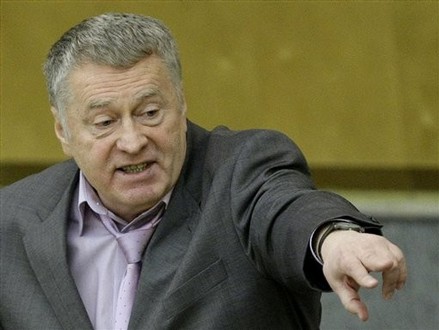
Russia sees vindication of its killing practices in the death of Osama bin Laden
Publication: Eurasia Daily Monitor Volume: 8 Issue: 87
By:

Russian officials reacted favorably to the killing of the al-Qaeda terrorist network leader Osama bin Laden by SEAL commandos during a raid of a compound in Abbottabad, Pakistan. The Kremlin congratulated the United States with a “serious success in the fight against international terrorism” and called for more security cooperation. The Foreign Ministry, in a short statement, expressed gratitude that Moscow was privately informed by Washington about the slaying of bin Laden before the news was made public. The statement continued: “Russia is a partner in the antiterrorist coalition and we share American feelings,” and that “al-Qaeda has been decapitated.” The statement compared the “success of US commandos” with the “work of the Russian special services in the North Caucasus” in dealing with local rebels and “al-Qaeda emissaries.” The statement directly compared the demise of bin Laden with the slaying of Chechen insurgent warlord Shamil Basayev by a remotely controlled explosive planted by Russian special forces in 2006 (www.kremlin.ru, www.mid.ru, May 2).
Russia has for many years been insisting the insurgency in the North Caucasus was inspired by al-Qaeda and other foreign forces. A policy of assassinating terror and rebel suspects, instead of attempting to capture them, has been run for years. Such summary executions also happened on foreign soil: In 2004 former Chechen rebel president Zelimkhan Yandarbiyev living in exile in Qatar, was killed by a bomb planted in his car while he was praying at a mosque. Two Russian military intelligence (GRU) officers were arrested and convicted by a court in Doha for planting the bomb, but later extradited to Moscow. Today the apparent shoot-to-kill actions of the US SEALs in Abbottabad are seen in Moscow as vindication of previous similar targeted killings of rebel terror suspects, and a carte blanche to do so in the future. Chechen pro-Moscow leader and warlord Ramzan Kadyrov together with other officials and parliamentarians saluted the killing of bin Laden and insisted that there be “no double standards,” and that all terror suspects be treated alike (RIA Novosti, May 2).
The Russian National Anti-Terrorist Committee (NAK) announced on May 4 that, in a “special operation in Chechnya, it had killed” the “emissary and main coordinator of al-Qaeda in the North Caucasus”—Turkish-born Doger Sovded also known as Abdulla Kurd. According to NAK, Abdulla Kurd “controlled and distributed financial contributions coming form abroad to finance the terrorist underground in the North Caucasus.” It was claimed that Abdulla Kurd was the deputy of Moganned—the previous “emissary and main coordinator of al-Qaeda in the North Caucasus”—killed by security forces in Chechnya on April 12. According to HAK, Abdulla Kurd took over command form Moganned and now has been killed in turn “as a result of active cooperation with foreign partners” in the antiterrorist coalition (RIA Novosti, May 4).
After the killing of bin Laden, the rhetoric of authorities in Moscow seemed to have somewhat returned to the times after 9/11 when relations with the United States and the West were fine and the “international antiterrorist coalition” appeared to be more than an empty shell. The usually rabidly anti-American flamboyant nationalist Vladimir Zhirinovsky, who always closely follows the political atmosphere in the Kremlin and is frequently used by authorities as an unofficial mouthpiece, on May 2 applauded the killing of bin Laden and called for closer US-Russian security cooperation. “We must do the right thing: Russian and US special services must at last agree on strategic partnership,” announced Zhirinovsky, “If we act together instead of hindering each other, we will kill them all” (www.newsru.com, May 2).
After 9/11 there was indeed effective East-West cooperation. Russia supported the US-led invasion of Afghanistan and the crushing of the Taliban regime. This removed the threat to essential Russian interests and strategic defense installations in former Soviet Central Asia, where long-serving post-Soviet dictators may have been undermined by Taliban-supported insurgencies. In the North Caucasus, Western efforts to impede Islamist-controlled fund-gathering organizations greatly reduced the flow of money and volunteers to rebels, as the international Islamist movement changed its priorities, and began channeling men and resources into destabilizing Iraq, Afghanistan and Pakistan.
Today the situation has changed dramatically. According to First Deputy Commander of the Interior Troops of the Interior Ministry (MVD) Lieutenant-General Alexander Butin: “Many extremist groups in the North Caucasus have learned to survive without money from abroad by forcing local businessmen and corrupt officials to pay a levy.” According to Butin, “up to 80 percent of all terrorist attacks in the North Caucasus are in fact protest actions” against total official corruption, and are supported by the local population. Federal development programs designed in Moscow to undermine the North Caucasian insurgency by creating jobs and improving life conditions, states Butin, in fact lead to increased terrorist activity. Butin connects the upsurge of violence in Kabardino-Balkaria with plans to build a sky resort. The misappropriation of massive federal funds by corrupt officials increases social tension, disrupts traditional communities and, in part, eventually finances terror (VPK, May 4). If the main financial, social and political source of terrorism in the Northern Caucasus is overwhelming corruption and nepotism, increased anti-terror cooperation with the US may not bring major results without significant regime changes in the region and in Moscow.
The bewildering and seemingly unstoppable flow of contradictory statements from President Barack Obama’s White House about the details of the killing of bin Laden soon changed the mood of comments in Moscow from praise to mockery and concern. Zhirinovsky also soon changed heart, possibly reflecting the mood of Russia’s rulers, calling the raid on Abbottabad “a staged event,” its main aim being to boost Obama’s popularity. According to Zhirinovsky, Russia may suffer if Islamists in addition to the North Caucasus turn to undermine secular regimes in Central Asia (RIA Novosti, May 4). Indeed, the killing of bin Laden may facilitate the withdrawal of Western militaries from Afghanistan, which may in turn leave the present Central Asian dictatorships exposed, while Russia’s military is in the midst of a faltering reform—badly prepared to contain any additional major emergency.




